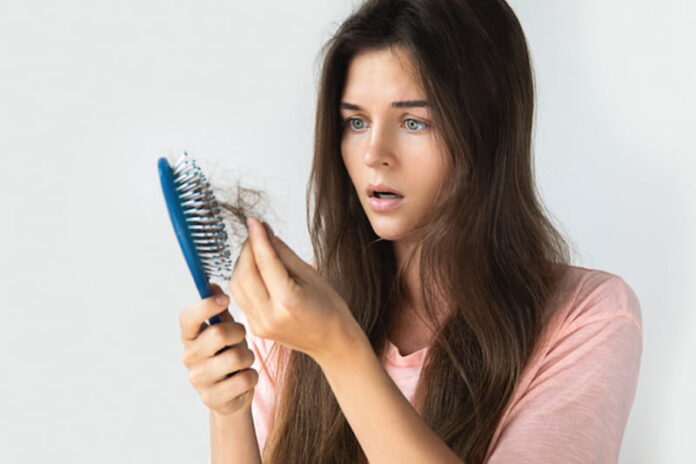Are you losing hair during period, and it seems excessive? Or do you worry about a thinning scalp no matter how healthy your hair looks at other times of the month?
When hair gets thin, many women often blame the stress on their periods. But is that really the case?
In the article below, we are going to review the causes of hair loss, be it due to the menstrual cycle or because of some other reason. Keep reading for potential reasons why you might experience hair loss during your period.
Hormonal Changes
Hormones play a significant role in hair growth and shedding. During the menstrual cycle, there are fluctuations in hormone levels, particularly estrogen and progesterone. These hormonal changes can impact the hair growth cycle, leading to increased hair shedding.
If you are experiencing excessive hair loss during your period, you can contact these hair restoration experts. They offer thorough workup, diagnosis, and treatment for all forms of hair loss.
Iron Deficiency Anemia
Losing hair during your period could be caused by iron deficiency anemia. The condition occurs when the body fails to produce enough red blood cells, resulting in an inadequate supply of oxygen to cells, including those found in hair follicles.
Treatment includes iron supplementation, along with lifestyle changes such as an increase in intake of nutrient-rich foods like eggs, spinach, and legumes.
Stress
Stress can impact hormone levels and disrupt the hair growth cycle, leading to hair shedding. Many individuals experience increased stress levels during their menstrual cycle, which could contribute to hair loss. Reducing stress levels during periods can be a great way to keep hair from falling out.
Nutritional Factors
A balanced diet is crucial for maintaining healthy hair. If your diet lacks essential nutrients, such as vitamins, minerals, and proteins, it can contribute to hair thinning and shedding.
Eating a balanced diet rich in essential vitamins and minerals can help to keep the hair healthy and strong. Drinking plenty of water throughout the day and getting adequate sleep can help preserve the healthiness of the hair.
Genetics
Your genetic makeup can also play a role in your susceptibility to hair loss. If you have a family history of hair thinning or pattern baldness, you might be more prone to experiencing hair loss.
Thyroid Issues
Thyroid imbalances, such as hypothyroidism or hyperthyroidism, can affect hair growth and cause hair loss. Thyroid issues might coincide with menstrual cycle-related hair loss.
Other signs of a possible underlying thyroid issue include fatigue, weight gain or loss, increased sensitivity to cold, heat, or long-term irritability. If you’re experiencing excessive hair loss associated with your period, it’s best to speak to your doctor.
Losing Hair During Period? A Few Tips to Minimize It
Are you losing hair during period? There is no one specific solution to preventing hair loss during menstruation. However, following a healthy diet and lifestyle habits can help reduce hair loss.
Additionally, avoid taking certain medications, such as birth control and hormonal therapy, and speak to a healthcare professional about other ways to reduce hair loss. Taking action now can help you regain your beautiful hair.
For more on this topic, check out the rest of our blog.
Read Also
- The Role of Ingredients in Your Skincare: What to Look ForSkincare works best when you understand what goes into the products you use daily. Ingredients form the foundation of every formula and determine how the skin reacts over time. Each cream, cleanser, or serum has its own role, determined by its ingredients. Learning what to look for helps you pick products that help skin and… Read more: The Role of Ingredients in Your Skincare: What to Look For
- Your Guide to Finding a Trusted DentistChoosing the right dentist in Sandgate or your area is crucial for maintaining good oral health and achieving a confident smile. With countless dental practices to choose from, patients may find the task daunting. Data from the American Dental Association indicates that there are over 200,000 practicing dentists in the United States, highlighting the importance… Read more: Your Guide to Finding a Trusted Dentist
- Achieving a Defined, Balanced Facial Contour in SingaporeA well-defined jawline and a gently tapered lower face — commonly referred to as a V-shaped face — is a look many people aspire to. In Singapore’s beauty and aesthetic scene, treatments that help refine facial contours have grown in popularity as more individuals seek subtle, natural enhancements that boost confidence and balance facial features.… Read more: Achieving a Defined, Balanced Facial Contour in Singapore
- The Wellness Blueprint: How Your DNA Holds the AnswerGenetic testing is revolutionizing preventive healthcare by offering insights into individual health risks. By analyzing DNA, these tests provide a personalized health blueprint that can guide lifestyle and medical decisions. This approach, often referred to as DNA wellness testing, helps to optimize health naturally and prevent potential diseases. In recent years, genetic testing has become… Read more: The Wellness Blueprint: How Your DNA Holds the Answer
- Exploring the Benefits of Infusion Therapy in OKC: The Ultimate GuideUnderstanding Infusion Therapy: A Deep Dive into Its Purpose and Process What exactly is Infusion Therapy? Infusion therapy is an advanced medical treatment that delivers medication and nutrients directly into the bloodstream through a vein, typically via an IV (intravenous) line. This method is particularly beneficial for patients who require a concentrated dose of medication,… Read more: Exploring the Benefits of Infusion Therapy in OKC: The Ultimate Guide






